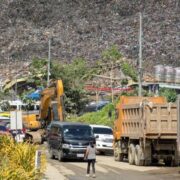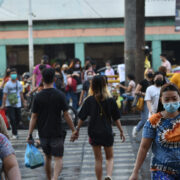Jica study gives warning over state of Luzon river basins

The Pampanga River, Pasig-Marikina River and Laguna Lake basins are at risk of extreme climate events, such as flooding and drought, a Japan International Cooperation Agency (Jica) study warned as it also urged an overhaul of land-use and infrastructure plans across Luzon.
More extreme rainfall and prolonged dry spells are projected to hit the Pampanga River Basin, raising the likelihood of more severe flooding and droughts in nearby communities, according to the Jica research conducted from 2021 to 2025.
The Pasig-Marikina River and Laguna Lake basins, on the other hand, will experience more severe flooding and increased sediment inflow, potentially inundating lakeshore communities and degrading water quality.
Jica did not provide other details when it presented the findings on Wednesday last week.
Land use updating
But it advised the government to strengthen rainwater drainage systems, develop upland communities, and integrate sediment and runoff dynamics into policy and planning.
“The report recommends updating land-use and infrastructure plans based on future climate projections to reduce the risks associated with future flood and drought events, and promoting climate-responsive watershed planning and management,” the agency said in a statement.
The Pampanga River Basin is the fourth largest in the country that flows through the central plain of Luzon, which contributes a third of the country’s rice production, and is known as the “rice granary.” Rapid development and the warming climate have increased the chance of annual flooding in the basin, according to studies.
It covers an approximate aggregate area of 10,540 square kilometers, and extends over the southern slopes of the Caraballo Mountains, the western slopes of the Sierra Madre range and the major portions of the central plain of Luzon.
On average, the basin experiences at least one flooding a year.
7th most affected
The Pasig-Marikina River Basin is the main river basin that runs from Rodriguez, Rizal, down to Pasig City passing through San Mateo, Rizal, and Marikina City, before draining into Manila Bay.
Cities and towns along this system, such as Marikina City, Cainta, Rizal; San Juan City as well as the Paco-Tondo area, are prone to annual flooding, studies show.
Nearby is Laguna Lake Basin, which is connected to the Pasig-Marikina River through the Napindan River and the Manggahan Floodway. It is reportedly the largest inland body of water in the country.
When storms hit the archipelago, several lakeshore towns go underwater, especially when floodwaters from the Marikina River are diverted to the lake, which has a restricted channel outlet to Manila Bay, according to studies.
In 2024, the Philippines ranked the seventh most affected country by extreme weather events, according to the Climate Risk Index (CRI) 2026 by nongovernment development and environmental organization Germanwatch.
Germanwatch highlighted the devastation wrought by Supertyphoons “Carina” (international name: Gaemi), “Enteng” (Yagi), “Pepito” (Man-Yi), Typhoon “Kristine” (Trami), and the extreme heat wave from April to May last year spawned by the El Niño phenomenon.
The archipelago was also the seventh most affected country in the 1995 to 2024 period when it experienced 371 extreme weather events.
Recently, Typhoons “Tino” (Kalmaegi) and “Uwan” (Fung-wong) cut a wide swathe of devastation in central and northern Philippines, leaving more than 200 people dead.
Jica’s research was undertaken under its Hybrid Water-Related Disaster Risk Assessment and Policy Development Project (HyDEPP). The research paper will be publicly available next year.
The research spanned more than four years and involved data collection, the development of an assessment model integrating climate, hydrological, agricultural, and socioeconomic systems, and the formulation of policy recommendations. —WITH A REPORT FROM INQUIRER RESEARCH

















